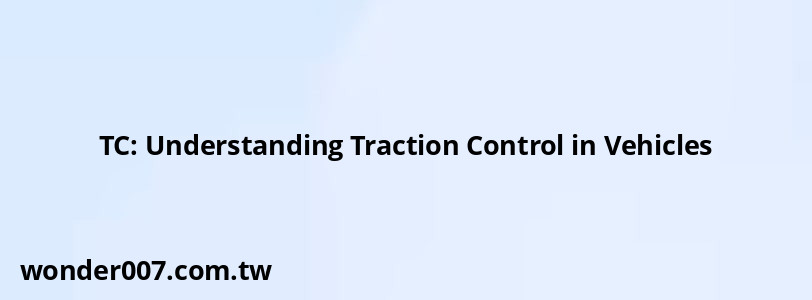TC: Understanding Traction Control in Vehicles

TC, or Traction Control, is a crucial automotive feature designed to enhance vehicle stability and safety. It plays a significant role in preventing wheel slip during acceleration, especially on slippery surfaces such as wet or icy roads.
What is Traction Control (TC)?
Traction Control is a safety system that helps maintain the grip between the tires and the road. It works by monitoring the speed of each wheel and intervening when it detects that one or more wheels are spinning faster than others. This typically occurs in low-traction situations, where the vehicle might lose control.When the system is activated, it can:
- Apply brakes to the spinning wheel(s) to reduce their speed.
- Adjust engine power to prevent excessive wheel spin.
This intervention allows the vehicle to regain traction and maintain stability, making it easier for drivers to navigate challenging driving conditions.
How Does TC Work?
The traction control system (TCS) utilizes various sensors, including yaw rate sensors and wheel speed sensors, to continuously monitor vehicle dynamics. If a wheel begins to spin too quickly compared to others, the TCS activates to help restore traction. The system operates in conjunction with other safety features like the Anti-lock Braking System (ABS), which also helps prevent wheel lock-up during braking.
Key Functions of TC:
- Maintains Stability: Helps keep the vehicle stable during acceleration on slippery surfaces.
- Prevents Skidding: Reduces the likelihood of skidding by managing wheel spin.
- Enhances Safety: Increases overall driving safety by providing better control in adverse conditions.
When Should You Use TC?
While TC is designed to be active at all times, there are specific scenarios where its benefits are most pronounced:
- Rainy or Icy Conditions: Keeps traction on wet or icy roads.
- Off-Roading: Helps manage traction when driving on loose gravel or mud.
- Steep Inclines: Provides additional grip when climbing steep hills.
Drivers can usually turn off the traction control system if necessary, such as when trying to rock a vehicle out of snow. However, it is generally advisable to keep it engaged during typical driving conditions for enhanced safety.
Understanding TC Warning Lights
Many vehicles are equipped with a warning light for the traction control system, often labeled as "TC" or "TCS." This light may illuminate under certain conditions:
- Flashing Light: Indicates that the traction control system is actively working to maintain grip.
- Solid Light: Suggests a potential issue with the traction control system that may require professional inspection.
It's essential for drivers to pay attention to these indicators and consult their vehicle’s manual for specific guidance regarding their model's traction control features.
FAQs About TC
- What does TC stand for in cars?
TC stands for Traction Control, a safety feature that helps prevent wheel slip. - How does traction control improve safety?
It enhances safety by maintaining tire grip on slippery surfaces and preventing skidding. - Can I turn off traction control?
Yes, most vehicles allow you to manually turn off the traction control system when needed.
Related Posts
-
Dodge Ram 1500: Understanding the Trans Temp Light
27-01-2025 • 206 views -
Check Fuel Fill Inlet: Understanding the Warning and Solutions
29-01-2025 • 128 views -
Lexus ECT Power: Understanding Your Driving Experience
26-01-2025 • 182 views -
2014 Jeep Grand Cherokee: Understanding the Check Engine Light
26-01-2025 • 236 views -
Lexus RX 350: Understanding Dashboard Warning Lights
26-01-2025 • 301 views
Latest Posts
-
Power Steering Fluid Leak On Passenger Side
01-02-2025 • 461 views -
2015 Chevy Traverse AC Recharge Port Location
01-02-2025 • 418 views -
Rear Brake Caliper Piston Won't Compress
01-02-2025 • 361 views -
Are O2 Sensors Covered Under Warranty
01-02-2025 • 378 views -
How To Turn Off Paddle Shifters Mercedes
01-02-2025 • 387 views
Popular Posts
-
Power Steering and ABS Light On: Causes and Solutions
27-01-2025 • 649 views -
Toyota Hiace: Fuel Efficiency Insights for 2025
26-01-2025 • 646 views -
EPC Light: Understanding Causes and Solutions
26-01-2025 • 1065 views -
Hino Warning Lights: Understanding Dashboard Alerts
26-01-2025 • 794 views -
V12 Engine Costs: What You Need to Know
26-01-2025 • 688 views
